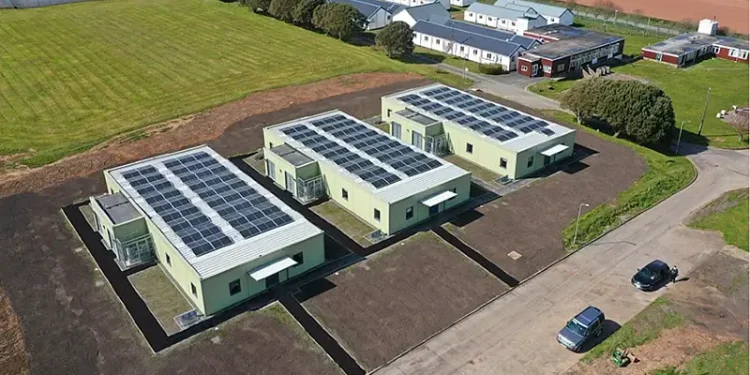The UK Ministry of Defence (MOD) has marked a significant milestone in its quest for sustainability with the completion of its award-winning Net-Zero Carbon Accommodation Programme (NetCAP).
This initiative is not only transforming the living conditions for military personnel but also making substantial strides in reducing carbon emissions.
NetCAP’s Ambitious Goals
The NetCAP programme, a multi-million-pound investment, aims to deliver over 70 carbon-efficient accommodation blocks across the UK Defence Training Estate (DTE). These buildings will provide more than 3,900 new bed spaces, replacing outdated facilities such as Nissen huts that have been in use since the 1930s.
Working in collaboration with the Defence Infrastructure Organisation (DIO), Landmarc Support Services, and modular construction specialist Reds10, the programme has already achieved remarkable carbon savings.
Efficient and Innovative Construction
The construction process has been optimized through modular techniques, where large parts of the buildings are assembled off-site.
This approach has reduced the manufacture and installation time significantly, from 15 weeks for the prototype at Westdown Camp to just 13 weeks for subsequent buildings.
The use of SMART building technology has also been instrumental, providing detailed data on energy usage that feeds directly into the design and specifications of subsequent buildings.
This continuous improvement has led to buildings with Energy Performance Certificate (EPC) ratings as low as -10, meaning they generate more power than they consume.
Enhanced Living Conditions
The new accommodation blocks are designed to provide a modern and comfortable living environment for military personnel. Each block includes beds, showers, ablutions, and drying rooms, eliminating the need for troops to move between different buildings.
The inclusion of rainwater harvesting systems and heat recovery mechanisms in showers and drying rooms further enhances the sustainability and efficiency of these facilities.
For soldiers using these facilities, the improvement in living conditions is palpable, contributing to a better overall experience and quality of life.
Expanding Sustainability Initiatives
As the MOD continues to push towards its net-zero target by 2050, the success of NetCAP serves as a blueprint for future sustainability initiatives.
The programme has already saved over 9,100 tonnes of carbon across the entire project, with a 33% reduction in embodied carbon between the initial prototype and subsequent buildings.
Future plans include the installation of the DTE’s first carbon-negative Combined Joint Operations Centre (CJOC) at Wretham Camp in Suffolk, further solidifying the MOD’s commitment to environmental sustainability.
Green Technologies
-
Rooftop solar panels
-
Air source heat pumps
-
Advanced insulation measures
-
AI and SMART technology for energy monitoring and optimization
Recent Innovations
Benefits and Impact
-
Over 9,100 tonnes reduction in embodied carbon
-
Approximately 130 tonnes of carbon saved per building
-
Support for local economies through local labour and materials
-
‘Excellent’ ratings under the Defence Related Environmental Assessment Methodology (DREAM)
-
The MOD
-
DIO
-
Landmarc Support Services
-
Reds10
-
Expansion to more locations, such as Castlemartin Training Area in Pembrokeshire
-
Additional buildings at Westdown Camp
-
Exploration of other sustainable housing initiatives, such as net-zero carbon homes at Imjin Barracks in Gloucestershire
To Sum Up
The Net-Zero Carbon Accommodation Programme is a beacon of sustainability in the UK’s military infrastructure. As the MOD moves forward with its environmental commitments, the lessons learned and innovations implemented through NetCAP will be crucial.
This programme not only enhances the living conditions of military personnel but also sets a precedent for sustainable development across the UK’s defence estate.
Sources: THX News & Defence Infrastructure Organisation.









